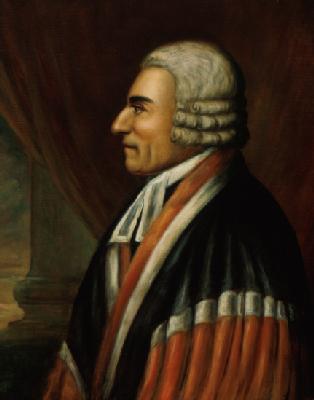
William Cushing
William Cushing (March 1, 1732 – September 13, 1810) was one of the original five associate justices of the United States Supreme Court; confirmed by the United States Senate on September 26, 1789, he served until his death.[2] His Supreme Court tenure of 20 years and 11 months was the longest among the Court's inaugural members.[3] In January 1796, he was nominated by President George Washington to become the Court's Chief Justice; though confirmed, he declined the appointment.[2] He was the last judge in the United States to wear a full wig (Court dress).[4][5]
For other people named William Cushing, see William Cushing (disambiguation).
William Cushing
Seat established
March 1, 1732
Scituate, Massachusetts Bay
September 13, 1810 (aged 78)
Scituate, Massachusetts, U.S.
Early life and education[edit]
Cushing was born in Scituate, Massachusetts Bay, on March 1, 1732. The Cushing family had a long history in the area, settling Hingham in 1638. Cushing's father, John Cushing (1695–1778), was a provincial magistrate who in 1747 became an associate justice of the Superior Court of Judicature, the province's high court. William Cushing's grandfather John Cushing (1662–1737/38) was also a superior court judge and member of the governor's council.[6]
Cushing's mother, Mary Cotton Cushing, was a daughter of Josiah Cotton (1679/80–1756). They were descended from Rev. John Cotton, the great 17th century Puritan theologian. Josiah Cotton and Richard Fitzgerald, a teacher at a local Latin school, were responsible for young Cushing's early education.[7]
Cushing graduated from Harvard College in 1751 and became a member of the bar of Boston in 1755. After briefly practicing law in Scituate, he moved to Pownalborough (present-day Dresden, Maine, then part of Massachusetts), and became the first practicing attorney in the province's eastern district (as Maine was then known). In 1762 he was called to become a barrister, again the first in Maine. He practiced law until 1772, when he was appointed by Governor Thomas Hutchinson to replace his father (who had resigned) on the Superior Court bench.
Later life and death[edit]
In 1810, Cushing died in his hometown of Scituate, Massachusetts. He is buried in a small cemetery there which is also a state park.